Mutebile will be pleased to learn no Shs100 coin is wasted in Nebbi

What you need to know:
Building a church. Many look at church as the community, and not the structure. But now our concern is, how do we ensure that the people are protected from the sun and rain? How do we support a local community that on their own has shown leadership and done something for themselves?
When I was growing up, there were 34 districts in Uganda and we memorised all of them. Nebbi was among the small districts with only three constituencies and inhabited by the Alur.
Many Alur are in the DR Congo. Those in Uganda are found in the constituencies of Jonam, Padyere and Okoro, now Pakwach, Nebbi and Zombo districts respectively.
Legend has it that the Alur are the lazy descendants of Gipir and Labongo, who could not continue to other parts of Uganda and Kisumu in Kenya. But I have heard, they are generally good and hardworking people.
As you drive into Nebbi Town from Kampala on a Sunday morning, you will find a very large crowd by the roadside on the left, sitting under three large mango trees attending Holy Mass.
The large imposing mango trees by the unfinished church wall have hosted churchgoers for over three decades. The community started praying in a grass-thatched structure in 1985 but begun building in 1997/1998.
My family started praying at Unjuku Church when I was barely in Primary One. We had just moved into this community a year or so before, and my mother felt that attending the church in our backyard was an excellent way to connect with the community.
The ‘built’ church, now Nebbi Cathedral was a long way from home. We therefore opted to join the community. We have enjoyed well animated services but also endured the scorching sun and stormy mornings some days.
In the beginning, we went to the ‘built’ church during Christmas and Easter celebrations, not anymore. The last decade we have welcomed the Lord when He is born at Christmas and celebrated His resurrection at Easter under those mango trees. We have given manufacturers of plastic chairs market, and happily carry our chairs to church and back home every Sunday,
The numbers have grown, maybe tenfold. It is difficult to even explain the numbers. It is truly, a community of believers. For many of us, this compound, that serves as a polling station during elections, is the church.
Many look at church as the community, and not the structure. But now our concern is, how do we ensure that the people are protected from the sun and rain? How do we support a local community that on their own has shown leadership and done something for themselves?
We never saw where the solution would come from. But as the they say, God chooses to use the most unlikely messengers. Nebbi recently received a new Resident District Commissioner, Mr Christopher Omara. After learning of the community’s commitment to this church and the large number of people who pray there, he provided leadership, to challenge us to do the right thing and complete this church.
His support and leadership led to creation of an interdenominational taskforce, which he is chairing.
The existing structure, now a complete wall, needs close to Shs300 million to complete. The community has their Shs20 million saved from previous efforts to fundraise.
We are going to top up that money to first roof it, so that there is shelter in the event the heavens open up during service. But we are going to continue mobilising until this church is complete.
As we fundraise, I am reminded of how in 2001 I was listening to a radio station in Kampala and a Member of Parliament narrated how she attended Holy Mass at Unjuku Church, under those mango trees. There was an offertory contribution between men and women. Many women lined up to compete and she put in a Shs20,000 note. To her surprise, the women had contributed a total of Shs26,000. To her, it represented the deep faith of the community but also the manifest poverty.
I was sad but knew she was right. To date, we still take those Shs100 for offertory, but I am impressed that it is bundles of that Shs100 that has built this church wall.
Central Bank Governor Emmanuel Mutebile will be pleased to learn that no Shs100 coin is wasted in this community. In fact, it is building Christ the King Church.
It may seem that Mr Omara came to Nebbi for such a time as this. Nebbi has sometimes been bitterly divided on political grounds. This unity, transcending denominations, district borders and economic status is a true demonstration of how we can change communities. It is an excellent example of how communities can chart their transformational agenda and act with their limited resources. We hope to support their incredible commitment with ideas and additional resources. And one project at a time, we will contribute to the transformation of our community, district and country.
Dr Maractho is the head and senior lecturer, Department of Journalism and Media
studies at UCU. [email protected]


